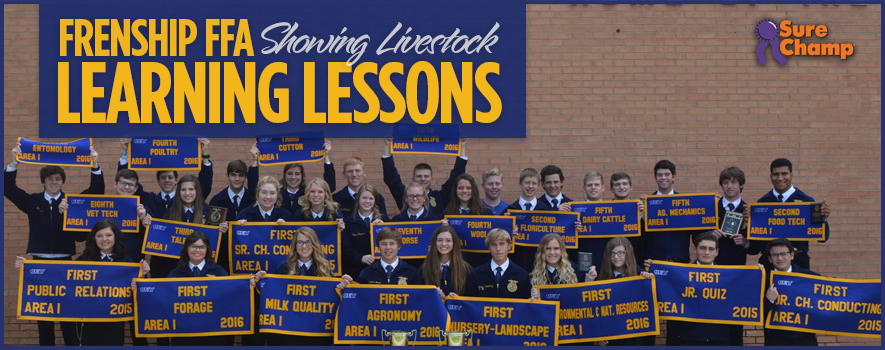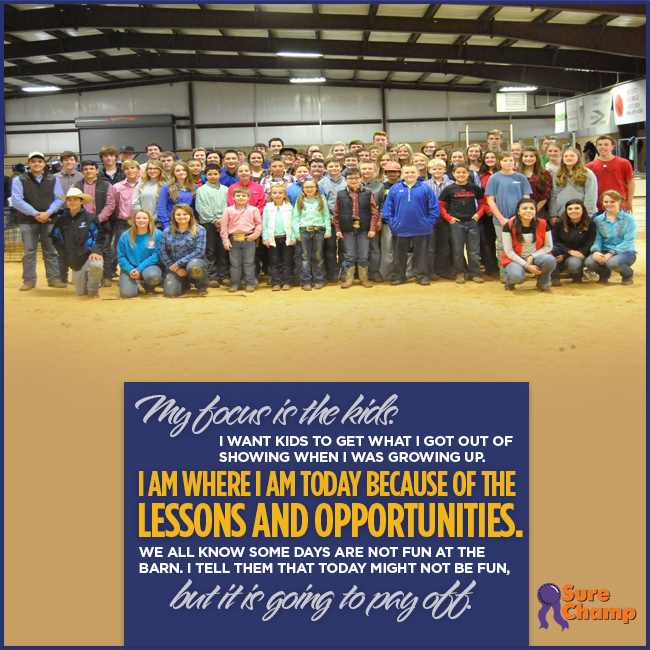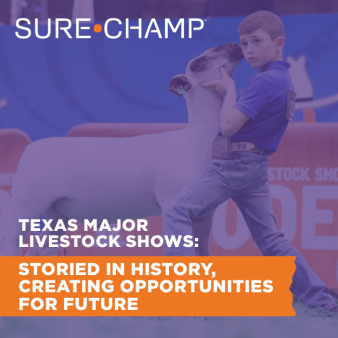
When Frenship FFA students decide to show livestock they go all in. Not just with the right kind of nutrition and training, but with a barn full of quality livestock and even higher quality students who work to make the chapter successful.
Frenship FFA advisor Meredith Couts says the chapter, located near Lubbock, Texas, shows nearly 200 pigs, 30 steers and heifers, 20 sheep and a dozen goats each year. They manage the livestock in five different barns. With 150 FFA members who participate in showing these kids help each other in every way, by taking turns feeding on mornings, evenings and weekends and scheduling barn shifts for cleaning and working with animals.
The chapter, which includes 500 ag education students, not only shows livestock but is also involved in every FFA contest possible, ranging from livestock to crops to soil and public speaking. During the most recent school year the chapter had 24 teams actively competing in FFA contests and events.
 So why does this busy chapter place emphasis on showing livestock?
So why does this busy chapter place emphasis on showing livestock?
Couts says it’s because that’s how she and her fellow ag teachers grew up. They realize and appreciate the responsibility of how taking care of animals has shaped their careers paths and only want the same for the students they teach. Frenship FFA is also fortunate to have active parents who help and care very much that their children learn the value of showing livestock in addition to being academically inspired and competitive in sports and FFA contests.
“They learn they have to be there to feed the same time every day,” Couts says. “We plan ahead if someone is going to be gone so they have someone else taking care of the livestock. This way we know if they’re gone that their animals are being fed and exercised correctly every day. Students also learn that if they didn’t do as well as last year then they can change things or do more to be successful. If they’ll spend the time and effort they’ll do well, and we drive that point home with them.”
Frenship FFA offers a junior FFA program where third through eighth graders can enroll in the chapter programs and activities. This younger level of involvement is also a big reason the chapter is active with livestock shows because they have plenty of help and energy to work as a team.
The Frenship FFA members have a routine that would mirror most livestock breeders. Each morning they do a health check. Couts or another advisor will walk pens with a medicine bag. If something doesn’t look right they can monitor it and treat the animal. Parents help with this task as well and with 300 show animals on feed this task is very important to their success.
Couts says there is also a work crew of a dozen students who volunteer then are assigned to work shifts in the show barns. The work crew covers everything from cleaning pens and stalls to feeding to washing between the hours of 4 p.m. to 9 p.m. During the Texas Major show season the students work together to feed by 7 a.m. before school begins. Many FFA members can drive and will carpool other members in to care for their show animals.
The FFA chapter is blessed with a strong booster club as well. Parents and community members continually host fundraisers including a gun raffle, skeet shoot and a golf tournament with funds dedicated to scholarships and premiums given to members at their local show. The students also build projects and receive generous donations of big items they auction off. The local feed store has an account set up for chapter members and gives back to the kids with an in-kind discount.
Couts says the chapter’s livestock show projects are a balancing act that requires a lot of planning. FFA students need classroom instruction as well as technical knowledge. For example, when the lesson involves vaccinations or animal health, Frenship FFA students can easily apply their knowledge by giving shots and nursing sick animals back to health.
One student, Zach, has dedicated a lot of time to his show animals. Couts says he’s shown since the third grade and has been in the show barn every day, working on whatever task needs to be accomplished. Zach purchased a pig from Couts’ father, who raises show pigs, and when he picked him from the litter he was a small pig with a scrotal rupture and other minor health issues. Zach nursed his pig to health and showed him to be the Reserve Grand Spotted Barrow at the Houston Livestock Show. This was a proud moment for Couts and Zach, who learned the value of his hard work.
“I tell the kids it’s really not about how much you spend on show animals,” Couts says. “My dad told Zach that if the pig lived through all of his ailments then he could have the pig for a minimal cost. But that little pig never missed a beat, never went off feed, and Zach managed him to be a winner at a show earning $10,000. He worked so hard, and he deserved it.”
At the beginning of the show season Couts says the students and parents have a meeting where they decide what they will show and how much they want to spend. Couts and fellow FFA advisors, Clay Conrad and Will Edwards, work to meet that budget, and the end goal is to make a local, county or major show sale and receive a return on that student’s investment.
Right now the Frenship FFA show barns were recently emptied so the students could power wash pens and clean everything with bleach. By the end of July, however, the next set of show pigs will be purchased and arrive at the barn. Couts says students are very grateful for the opportunity to show and be a part of livestock production and she knows they are learning terrific life lessons each season.
“My focus is the kids,” Couts says. “I want kids to get what I got out of showing when I was growing up. I am where I am today because of lessons and opportunities. Many times a student who shows later in high school will tell me they wish they’d starting showing earlier. We all know some days are not fun at the barn. I tell them that today might not be fun but is it going to pay off.”

